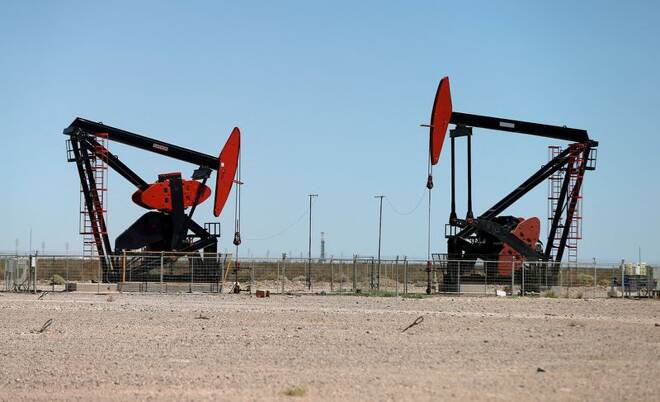Advertisement
Advertisement
Oil settles higher, posts weekly loss as China eases COVID curbs
By:
MELBOURNE (Reuters) - Oil prices rose on Friday as fears of a U.S. recession eased but were on track for weekly declines of more than 4% after a jump in COVID-19 cases in top oil importer China raised the spectre of weaker fuel demand.
By Laura Sanicola
(Reuters) -Oil prices settled higher on Friday but fell week-on-week after health authorities in China eased some of the country’s heavy COVID-19 curbs, raising hopes for improved economic activity and demand in the world’s top crude importer.
Brent crude futures settled up $2.32 at $95.99 a barrel, extending a 1.1% rise from the previous session but falling 2.6% on the week.
U.S. West Texas Intermediate (WTI) crude futures settled up $2.49, or 2.9%, at $88.96 a barrel, after climbing 0.8% in the previous session but down nearly 4% on the week.
The easing curbs include shortening quarantine times for close contacts of cases and inbound travelers by two days, as well as eliminating a penalty on airlines for bringing in infected passengers.
The benchmark oil contracts fell during the week due to rising U.S. oil inventories, and lingering fears over capped fuel demand in China, but late-week gains limited the losses.
“China’s changing response to stubbornly high COVID-19 cases has added to the oil market’s price volatility and, should this new Chinese policy continue, the energy complex could be poised to erase most of this week’s decline,” said Jim Ritterbusch, president of Ritterbusch and Associates LLC in Galena, Illinois.
A weaker U.S. dollar also supported oil prices as it makes the commodity cheaper for buyers holding other currencies.
Prices also picked up on Friday after milder-than-expected U.S. inflation reinforced hopes that the Federal Reserve would slow down rate increases, boosting chances of a soft landing for the world’s biggest economy. [MKTS/GLOB]
Saudi Arabia’s energy minister Prince Abdulaziz bin Salman said OPEC+ will remain cautious on oil production, noting that members saw “uncertainties” in the global economy ahead of the bloc’s next meeting in December, Bloomberg News reported on Friday.
The Organization of the Petroleum Exporting Countries and allies led by Russia, collectively known as OPEC+, last month agreed to steep production cuts, and will meet again on Dec. 4 to set its policy.
China’s COVID-19 caseload soared to its highest since the lockdown in Shanghai earlier this year. Both Beijing and Zhengzhou reported record daily cases.
Besides work-from-home orders reducing mobility and fuel demand, travel across China remained subdued as people wanted to avoid the risk of being caught up in quarantine, ANZ Research analysts said in a note.
(Additional reporting by Ahmad Ghaddar in London Sonali Paul in Melbourne and Jeslyn Lerh in Singapore; editing by David Evans,Tomasz Janowski and Jonathan Oatis)
About the Author
Reuterscontributor
Reuters, the news and media division of Thomson Reuters, is the world’s largest international multimedia news provider reaching more than one billion people every day. Reuters provides trusted business, financial, national, and international news to professionals via Thomson Reuters desktops, the world's media organizations, and directly to consumers at Reuters.com and via Reuters TV. Learn more about Thomson Reuters products:
Did you find this article useful?
Latest news and analysis
Advertisement
